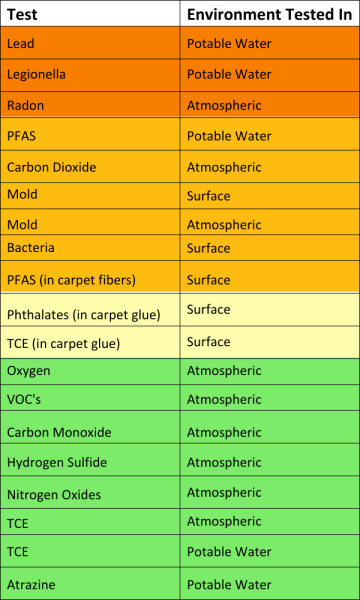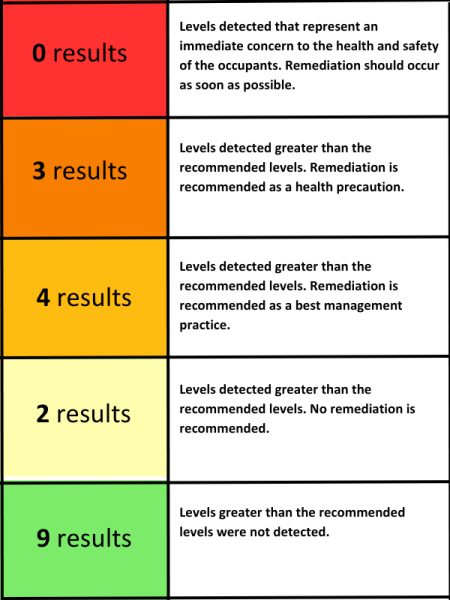Bucks County Community College closed the bottom two floors of Grupp Hall a few weeks before the Fall semester after an environmental scan found a variety of contaminants in the building including mold and radon.
Currently, Grupp Hall is undergoing a remediation process after Remington & Vernicks Engineers, a full-service engineering consulting firm based in Haddonfield, New Jersey, conducted an environmental scan of Grupp and Founders Hall.
The scan tested for 19 different contaminants including; carbon monoxide, carbon dioxide, oxygen, volatile organic compounds(VOCs), hydrogen sulfide, nitrogen oxides, trichloroethylene(TCE), lead, legionella, TCE(in air and carpet glue), per- and poly-fluoroalkyl substances(PFAS), atrazine, mold(in air and on surface), bacteria, phthalates and radon.
Two of the results found contaminants greater than recommended levels, but no remediation was recommended. Four results found contaminants greater than recommended levels, with remediation recommended as a best management practice. Three results found contaminants greater than recommended levels and recommended remediation as a health precaution, including lead and legionella in potable water and radon in the atmosphere.
Grupp Hall is an academic building on the Bucks Newtown campus that holds multiple classrooms for business, communications, language and literature, nursing, social science departments and faculties offices.
The President of the College, Dr. Felicia Ganther said, “This is the first time an environmental scan of this nature has been done,” but concerns and complaints of Grupp Hall date back several years.
The Centurion covered a story in April 2019 that highlighted faculty saying repairs were needed in Grupp and described it as “a sick building, filled with rattling rafters, a few dead bugs, cold and drafty …”
John Sheridan, president of the Bucks faculty union and a multi-discipline professor, said “Certain health conditions came to the attention of the federation leadership including headaches, chest pains, lightheadedness and a couple of people had rashes. The health concerns are what lead to the building concerns. The faculty with the college formed an ad hoc committee around mid-semester last Spring called the Building Related Illness ad hoc committee.”
The committee is co-chaired by Dr. Mary Dura and Dr. Kathi Knight and started its own investigation by looking into what type of complaints were being made and what areas and buildings they were coming from. They found most of the complaints came from Grupp and Founders Hall and requested the college to test them.
Ganther said, “When the facilities director informed me that faculty leadership wanted to do an environmental test on all of Grupp and Founders, at the recommendation of the Board of Trustees, the college hired Remington & Vernick Environmental Engineering to perform all of the requested testing. As we have shared the results of the testing, I have received additional concerns about other buildings on our campuses.”
Sheridan said, “After we got the results of the testing and looked at everything we realized we had a problem. The committee was most concerned about the high radon levels so we asked the college to close the building. There was nothing found in the test results that called for any immediate evacuation or danger but we didn’t want faculty and students going back in there.”
The college also hired Dr. Marilyn Howarth a founding professor of the University of Pennsylvania’s Masters in Public Health Environmental and Occupational Health who has been helping with remediation by giving the school a list of recommendations and a timeline.
The ad hoc building committee plans to test all three campuses within the next few months. Sheridan said, “We’re going to test everything on campus and put them in a list depending on the priority level of what needs to be addressed.”
Remediation efforts also include a thorough professional cleaning of both Founders and Grupp Halls, replacement of problematic carpets in Grupp Hall, advisory signage on water sources and installation of door vents in certain offices.
In the meantime, students and faculty have been dealing with the adjusted classrooms and offices during the first weeks of school.
Dr. Ethel Rackin, a language and literature professor at Bucks and the Wordsmith’s Reading Series and Poet Laureate program coordinator, said “There was not too much confusion the first couple days of classes. The other professors in the department and I have been pretty communicative with our students so everyone knew where to go.”
While accommodating their new students in temporary classrooms was a relatively easy obstacle to overcome, many professors are facing a massive nuisance with their old offices because their belongings are still inside. Dr. Rackin’s office has been on the first floor of Grupp for almost 15 years.
“I have books and significant college papers and files in my office, and I know there are some with electronics still in them. I would like the college to take responsibility for removing items,” she said.
While professors have expressed concerns about the health and safety of Grupp and other aging buildings on campus, students interviewed did not seem that concerned, or even aware of the issue. When asked their opinion on the matter several students gave responses such as “What email?” referring to the email that was sent to all students on Aug. 17 with information regarding the timeline, results and remediation process. Another student gave the response, “What’s an environmental scan?”
According to the Centers for Disease Control and Prevention, mold can cause a stuffy nose, sore throat, coughing, wheezing, burning eyes or a skin rash, and breathing in high levels of radon over time can cause lung cancer.
Eric Siddell who gave the remediation report at the college’s Board of Trustees meeting on Sept. 14 said, “We’ve been working and analyzing the situation for the past three weeks and reaching out to vendors for action on the items that were identified by Dr. Howarth. Right now we continue to see these costs and recommendations and as this information is provided we will update it.”
Students can visit https://www.bucks.edu/resources/security/health-safety/ for more information and to get updates on the remediation progress.




